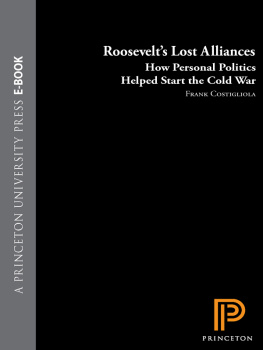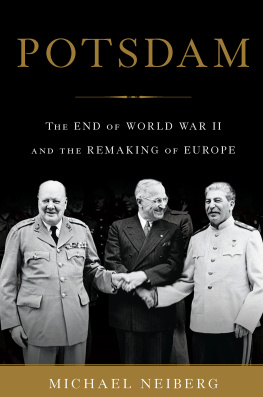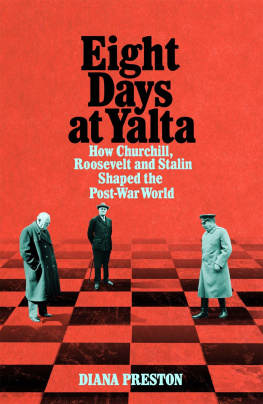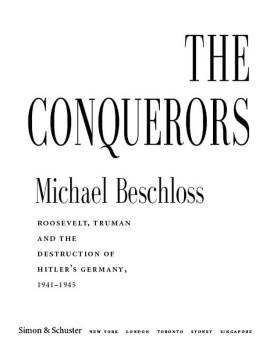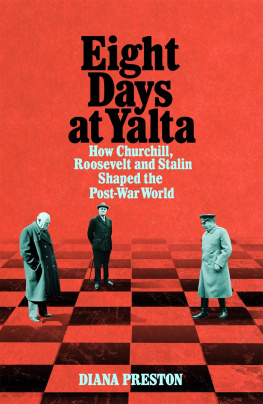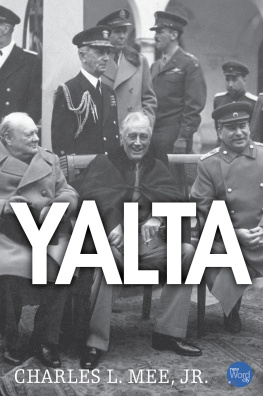Acknowledgments
This book evolved over a long time. Whether the development also evidences intelligent design, readers will have to decide. My study of how the Grand Alliance formed, functioned, and then collapsed started out as the projected first chapter of a book on how acculturation and emotional thinking shaped the Western alliance. Along the way, however, I became captivated by the achievements and the aborted promise of the wartime coalition. Compared with the post-1945 alliance, the structure of wartime diplomacy was more challenging, because here the two principal partners, the United States and the Soviet Union, nearly matched each other in power, whereas they diverged in ideology and in other aspects of culture. I discovered that although scholars have written shelves of books on the Big Three alliance and on the origins of the Cold War, they have neglected crucial aspects of the personal/political relations among the top leaders. Moreover, none of the many biographies of Roosevelt have focused on the tragedy that ensued from this president's depending on his closest aides while also making their lives so difficult. Rendering these topics all the more exciting was my finding untapped or underutilized primary sources.
The writing of this book was bracketed by residencies at two extraordinary havens for scholars, the Norwegian Nobel Institute in Oslo and the Institute for Advanced Study in Princeton, New Jersey. I am indebted to Geir Lundestad, Olav Njolstad, and Odd Arne Westad for creating such a stimulating and congenial place for study. Staff members Anne Kjelling, Grete Haram, and Torill Johansen smoothed the way with all things Norwegian. I benefited from discussions with other fellows, especially Christian Ostermann, who also introduced me to the theory and practice of afternoon shakes. My stay at the Institute for Advanced Study was generously supported by funds from the National Endowment for the Humanities and the Andrew W. Mellon Foundation. At the IAS, Peter Goddard, Avishai Margalit, Nicola Di Cosmo, Caroline Walker Bynum, Irving Lavin, and Marilyn Aronberg Lavin were extraordinarily hospitable and helpful. I also learned much from talking with Michael Lurie, Ruth Bielfeldt, Thomas Hegghammer, Sandy Isenstadt, Emma Dillon, Thomas Laqueur, Frances Nethercott, Igor Khristoforov, Don Wyatt, Siobhan Roberts, Peter Katzenstein, Judith Pfeiffer, and Fa-Ti Fan. Staff support was superb in every way. Indeed, my year at the Institute ranks as one of the best in my life. I was also privileged to spend a year at the University of Connecticut Humanities Institute, where Christopher Clark and the late Susan Porter Benson provided stimulating conversation and good cheer. UCHI director and History Department colleague Dick Brown offered pointed questions at a critical stage in the writing. My work on this book was supported also by a fellowship from the Guggenheim Foundation, funds from the University of Connecticut Research Foundation, and sabbaticals from the University of Rhode Island and the University of Connecticut.
I was exceptionally fortunate in the readers chosen by Princeton University Press: Tim Borstelmann, Richard Immerman, and Melvyn P. Leffler. Each offered smart criticism and helpful suggestions. I especially appreciate the page-by-page suggestions of Mel Leffler, my close friend since we met in the archives four decades ago. Richard was extremely generous with his time and effort as I did final revisions. Other friendsAndy Rotter, Emily Rosenberg, and Bob Deanread the entire manuscript and offered discerning advice. I have learned not only from the comments of these six readers but also from their pathbreaking scholarship. I was helped also by the suggestions of David Engerman, Kristin Hoganson, and Robert Nye on a draft of chapter 1. Geoffrey C. Ward and Steve Lomazow shared their insights on FDR. Roger Petersen offered a valuable reading from a political science perspective. I appreciate Bob Hannigan's help with the copy editing.
Gabriel Gorodetsky generously allowed me to use some selections from his forthcoming publication of Ivan Maisky's diary. June Hopkins was very thoughtful in sending me the unpublished biography of her grandfather, Harry Hopkins, written by James Halsted. Harry's daughter, Diana Hopkins, recounted fascinating aspects of her life in the Roosevelt White House. Geoffrey Wilson shared reminiscences of Archibald Clark Kerr. Andrew Preston and Geoffrey Roberts were kind enough to let me see their forthcoming books. Jeffrey Burds and Theodore A. Wilson graciously enabled me to benefit from their respective research projects. I am greatly indebted to Thomas Parrish for sharing interviews, done by the late Rudy Abramson, of Averell Harriman and his associates. Anand Toprani, Matthew Hinds, and Arthur Scott Mobley Jr. were generous with their unpublished work. Sherry Zane helped with research and allowed me to profit from her insightful work on FDR's early career. Michael Donoghue and Tom Westerman offered valuable research assistance.
J. Garry Clifford opened to me his trove of FDR documentswhile also doing much more to make this book possible. Our drives to Hyde Park developed into rolling seminars on Franklin Roosevelt. A superb editor, Garry was sometimes more adept than I in expressing my ideas. I would send him a chapter late at night and find a marked-up version in my inbox by 8:00 the next morning. Another good friend and gifted wordsmith, Robert Gross, was also generous with his time and suggestions. My understanding of FDR was expanded by the careful reading and sound advice of that dean of Roosevelt scholars, Warren F. Kimball. Lloyd C. Gardner also offered good counsel.
For more than four decades, Walter LaFeber has stood out for me as an inspiration. He has achieved an extraordinary career as conscientious scholar, concerned public intellectual, and committed teacherall the while remaining an eminently decent person. I treasure the long lunches with him and Sandy.
This book has gained much from the feedback of audiences at the University of Connecticut, Vassar College, Temple University, the University of Wisconsin at Madison, Ohio State University, the University of Oxford, and the Lone Star Forum, as well as my colleagues in the Society for Historians of American Foreign Relations. My research was aided by the superb staff at Connecticut's Homer Babbidge Library, the Olin Library at Cornell University, the Library of Congress, the National Archives at Kew, the National Archives in College Park, Maryland, and particularly by Dan Linke and Adriane Hanson at Princeton University's Mudd Library. At the FDR Library, I received skilled assistance from Robert Clark, Mark Renovitch, and Virginia Lewick. I owe a special thanks to archivist extraordinaire David Langbart. For help with the illustrations I am indebted to Sarah Craig, Doug Snyder, Annessa Stagner, and James Graham Wilson. My colleague at the Nobel Institute, Irina Bystrova, did research for me in Russian archives. Documents were also translated by Alla Kok. My Connecticut colleagues Larry Langer and Emma Gilligan pitched in with some spot translations, as did Denis Kozlov. I appreciate the support from Arnie Offner, Mark Stoler, David Foglesong, Vladimir Pechatnov, and Ann Douglas. Jeremi Suri offered encouragement at a crucial point. Joanne Meyerowitz clarified an important detail.
Editor Brigitta van Rheinberg has sustained her faith in this project while providing direction at critical points in its development. It has been a pleasure working with her. Sarah Wolf, Kathleen Cioffi, and Beth Gianfagna expertly shepherded this book through production at Princeton University Press.
Others have extended crucial support, including department chairs Mike Honhart at the University of Rhode Island and Altina Waller and Shirley Roe at the University of Connecticut, as well as Deans Ross Mackinnon and Jeremy Teitelbaum at UConn. Molly Hite offered generous help at critical stages in the writing. My friends Joel Cohen, Lester Marion, and Carole Masters have learned not to ask if the book was yet done. Mike Berkowitz has inspired me to always try for waiter's waiter. Also in my corner have been my mother, Nancy Costigliola, who has blossomed intellectually in her late eighties; my daughters Mali Cox-Hite and Jennifer Nancy Costigliola, the latter now a scientist/scholar in her own right; fellow writer Josh Tarsky; my granddaughter, Aviva Tarsky; and Charles and Martha Costigliola. My father, the late Umberto Costigliola, would have enjoyed reading this book. I value the bond with my fellow lover of history, Frank Bertucci.
Next page
